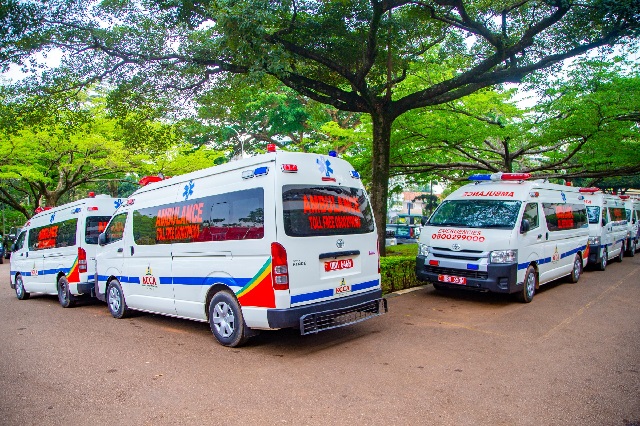
Kampala, Uganda | THE INDEPENDENT | Kampala Capital City Authority-KCCA has dispatched seven ambulances to the five city divisions worth Shillings 1.6 billion with the aim of improving emergency medical services. Dr. Daniel Okello, the Director of Public Health at KCCA told journalists at City Hall on Monday that they procured ambulances, which include 6 type B for basic life support and 1 Ambulance type C for advanced life support.
Dr. Okello explained that each ambulance cost Shillings 230 Million, which they drew from the KCCA COVID-19 funds. Dr. Sarah Zalwango, the Acting Deputy Director of Public Health at KCCA said that Type C Ambulance can be used for patients who need intensive care because it has an intensive care unit. The ambulance comprises a portable electric suction pump, Pneumatic Splints, an Automated External Defibrillator, a Transport ventilator, Pulse Oximeter, and an Oxygen cylinder among others.
The Emergency Services Policy that was passed by the cabinet will only allow ambulances starting with Type B. Politicians especially Members of Parliaments have been donating ambulances as one of the ways to attract voters. Most of the ambulances fall in Type A, which are only considered transport vehicles.
Type B ambulances are fitted with equipment to offer oxygen therapy, nebulization, monitoring of vital parameters, and automatic external defibrillation for diagnosing life-threatening heartbeats. While flagging off the Ambulances, the Kampala City Lord Mayor Erias Lukwago said that there was a need for a functional Ambulance system in Kampala with high-tech facilities like the Ambulances that have been launched.
Lukwago also said that Kampala needs over 70 Ambulances for a robust system to handle the emerging challenges but they only have 12.
He explained that they approved Shillings 150 million for each ambulance, which means that each division should have recieved 2 Ambulances, which didn’t happen. Lukwago revealed that they have since tasked the technical team to give them a detailed report on the purchase of the Ambulances.
He also revealed that they hoped to have a mobile clinic to be able to handle emergency cases in the communities, which has not happened. “I appreciate the fact that we may not restrict our operations only to the boundaries of Kampala because health needs don’t know boundaries so we have to stretch up to Wakiso and other parts of the country but we may have to go very far because our finances are constrained,” Lukwago noted.
*****
URN
 The Independent Uganda: You get the Truth we Pay the Price
The Independent Uganda: You get the Truth we Pay the Price



